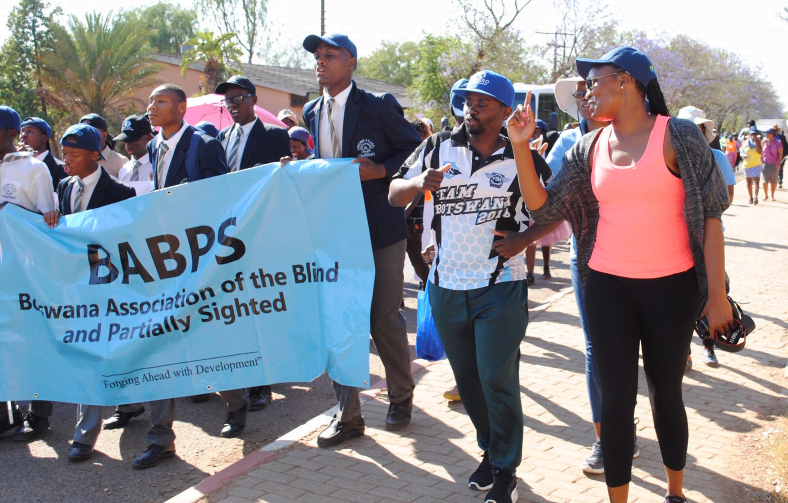It’s easy to forget how fortunate we are in Australia and how we take for granted the services on offer to those with vision loss. People living with disabilities receive a level of support which is far superior compared to underdeveloped countries.
This was really evident when Andrew Lyons, Partnership and Development Manager, met Tootsie Sigwele from Botswana, a volunteer with the Botswana Association for the Blind and Partially Sighted (link opens in new window).
Around 30% of the population in Botswana live below or just on the poverty line according to the World Bank. Unemployment levels are around 18%. Botswana is a land-locked country about the size of France, with a population of just over two million people and about half as many cattle.
In his own words, Andrew Lyons explains how he’s become a mentor for Tootsie who is now campaigning for better provisions for blind and partially sighted people. Her aim is to improve life for those living with vision loss in Botswana.

Tootsie’s fact-finding trip
I met Tootsie Sigwele through a chance visit and our introduction has left a lasting impression on me, one I won’t ever forget. A receptionist at VisAbility rang through to me and asked if I had time to talk to a lady in the waiting area. This unannounced visitor wanted to find out more about our service provision.
Tootsie, a Human Resources Manager lives in Botswana, Africa and is also a corporate volunteer for the Botswana Association for the Blind. She was visiting Perth on a fact-finding visit. Tootise wanted to implement better practices and ideas in Botswana. I gave Tootsie a tour of our building as well as a detailed run-down of our services.
Tour of VisAbility
During our tour, Tootsie had a constant look of amazement on her face. She was staggered at what was on offer but saddened that these types of services weren’t available in Botswana. By the end of her visit her sadness had turned into determination to improve services in her home country.
Could her dream to build better service provision in Botswana become a reality one day? You could see she was inspired to act because of what she’d experienced. As we continued walking around the building, I showed her the latest technology we used and and I demonstrated a variety of equipment such as video magnifiers and simple aids for daily living.
With the tour completed, I spent another hour or so with Tootsie and we discussed various programs run by VisAbility – all highly successful. We discussed common eye conditions experienced by our clients, such as macular degeneration, glaucoma and retinitis pigmentosa. Tootsie wore simulation goggles so she could get a better grasp of vision loss.
 Explaining our vision service provision
Explaining our vision service provision
VisAbility offers a number of Occupational Therapy programs. All our therapists adhere to the ‘Bigger, Brighter, Bolder and Being Organised’ principles. We also discussed the use and importance of utilising the senses in compensation for the loss of vision.
Taste for example would assist with telling the difference between self raising flour and flour. If you place a small amount of flour on your tongue, if it fizzes then you know it is self-raising. We also spoke about the sense of touch and used bottles of shampoo and conditioner as an example. You can tell the difference between shampoo and conditioner by placing a rubber band around the conditioner.
Tootsie and I then went on to discuss the importance of Orientation and Mobility. This training helps someone to get from A to B using a cane or other mobility services. The aim is to help those with vision impairment to navigate stairs, road crossings and understand depth perception. It’s giving them guidance and tools to travel independently around the community.
Transforming vision services in Botswana
28000 people living in Botswana have a vision impairment with most aged 50 years and older. Many of these have Glaucoma and operable cataracts. There is therefore a strong need to provide high-volume, high-quality, efficient and accessible cataract surgical services in Botswana to address cataract blindness.
Tootsie impressed me with her determination and passion to help the people of Botswana who are experiencing vision impairment. She had a number of ideas for fundraising and raising awareness of vision impairment in her country Botswana. This African country, a place I knew nothing about and had no connection, now meant something to me. Upon her return to Botswana, we communicated over email, phone and Skype to check on progress she was making. Through sheer determination Tootsie secured a free donation of a number of canes from Ambutech.
Another great milestone is that through sheer determination Tootsie has been very instrumental in securing funding to build a new centre for the Botswana Association for the Blind and Partially Sighted. The organisation is growing out of its small, rental premises and will eventually move to a better, more desired location. BABPS owns a spacious piece of land which is located 32kms from the capital city Gaborone. Two local companies are offering financial support so BABPS can develop and build a new centre on this land.
I look forward to working with Tootsie into the future. The vision impaired community in Botswana is lucky to have such a powerhouse on their side.
If you’d like to know more about what we do at VisAbility and what we offer visit our Services for more.

 Explaining our vision service provision
Explaining our vision service provision